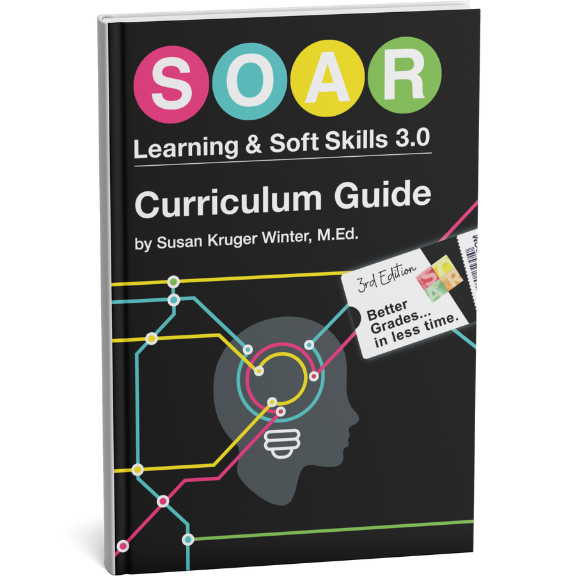Report Cards: Dealing with Poor Grades
If you’re like the millions of parents who open report cards and sigh, this article is for you.

Upon opening a report card, you experience a flood of emotions. Almost like going through the 5 stages of grief:
Denial: “No, this can’t be right. I made him sit at the kitchen table every night and complete his homework.”
Anger: “I’m so upset with her right now! I know she can do better. There are going to be consequences for this!”
Bargaining: “Maybe if I offer to buy him a new cell phone in exchange for better grades, I could entice him to try harder?”
Depression: “This is never going to change. I don’t know what else to do. I’ve tried everything. I’m just so tired of the battle over school.”
Acceptance: “Maybe she’s just not cut-out for school. I guess she’ll just have a different career path than most people. I just need to be ok with that.”
Most parents in this frustrating situation want to know both the cause and the solution for poor report cards. In talking with many parents that reach out to our team, we’ve noticed a trend in why students struggle and we’ve narrowed it down to 3 main reasons:
- Lack of Confidence
- Disorganization
- Lack of Skills
Lack of Confidence
For some students, the fear of failure is so REAL, that they don’t want to put forth any effort. This might sound illogical, but in my younger years this was actually something I struggled with myself. I went through school putting forth minimal effort, just enough to pass. My Mom always knew I could do better and encouraged me to do so. But, I was stuck in a mode of fear.
What if I try harder, but my grades don’t rise? Would that make me a failure? Would my Mom and others find out I was “stupid?” If I avoid putting forth the effort now, the focus will remain on my level of effort. Everyone (including my Mom) will assume that I’m smart and just not applying myself. They’ll never find out that I’m “not that smart after all.” This path is safe. I know the outcome and nobody judges my intelligence. I get to remain in control.
When students have this kind of fear of failure, it’s because they can’t envision a path to success. They don’t know where to start, so not starting at all seems like a safer route.
Disorganization
Some students have a desire to do well, and in fact try very hard. They’re putting forth the effort, but the wheels just seem to be falling off the cart.
They might be very active (sports, clubs, and social activities) and never seem to get their school work done. They want to get their work done, but there are so many things competing for their attention. They can’t keep track of everything. They struggle to monitor what’s due, when it’s due, and where their papers are.
In these cases, we often see parents threatening to take away participation on the sports team or eliminating time with friends, video games, etc. However, that still doesn’t address the root cause of disorganization. It just affords the student more time to wrestle with their disorganization. This ultimately leads to greater resentment and still does not fix the problem.
Lack of Skills
My son is a “rule follower.” He’s a great kid that tries really hard in school and at home with homework. However, we went through a period when his grades were suffering and I could see he was starting to resent school all together. Frankly, I couldn’t blame him, because I knew the effort and desire was present, but the results weren’t. I could see this look on his face of “what’s the point, I’m never going to find success regardless of how hard I try.” My son’s problem was a lack of study skills in general (organization, note taking, studying for tests, etc.)
What’s the Solution?
It appears that we have three different problems. So, it’s natural to think there’s three, unique solutions. However, most parents are surprised to hear that one solution solves all three of these problems, and many more.
The solution? Study skills. Here’s why…
Students struggling with confidence and thus motivation, are hesitant to put forth 100% effort, because they can’t envision “how” they could earn good grades. It’s that feeling that we’ve all experienced at one time or another of “I don’t even know where to begin.”
A key part to teaching successful study skills is to also teach the student about how their brain works and how the skills we teach will work congruently their natural brain processes. This approach gives students confidence that the study skills will work and that implementing these skills is worth the effort.
Students who suffer more from disorganization are usually eager to learn organization, but also don’t know where to start. Disorganization mainly effects time management and physical paper management. When we can teach very simple and effective organization skills, we can see the effects of disorganization evaporate, literally overnight.
However, there’s a caveat here… It’s not uncommon for students to slip back into old habits of disorganization. So, if you’re helping a student battle a disorganization problem, it’s important to keep reinforcing the organization portion of study skills on a regular basis until these skills become habit. This can take anywhere from 4-12 weeks depending on the student and the level of support from adults.
Finally, a confident, motivated, and hard-working student that just seems to “lacks skills in general” will benefit in multiple ways from learning study skills.
My son started 6th grade this year and was terrified by the thought of the increased rigor of middle school since he thought 5th grade was “tough enough.” So, we had him sit down and use our SOAR Learning & Soft Skills App to learn all about study skills.
While we knew “conceptually” the skills would help him, we were still pleasantly surprised by how effective the results have been. He’s keeping track of all his assignments using his planner. His papers are organized in his binder. He’s thoroughly enjoying the success of his efforts in school.
Sometimes, as human beings, we seek out complex solutions for what appear to be complex problems. However, we discover time and time again that the simplest solution is often the most effective.
The challenges in this article are no exception. The simplest fix to most educational challenges are teaching students the most effective skills for learning success: study skills.
If you’d like to learn more about our most effective approach to teaching your student these much-needed study skills, check out our SOAR Learning & Soft Skills App (online course) by clicking HERE.
Six Steps
Conquer the Chaos
Get Our Free Guide & Information on...
 How to Organize & Motivate Students for Success
How to Organize & Motivate Students for Success
"*" indicates required fields
Get Our FREE Curriculum Guide!
The SOAR® Curriculum
The most critical learning, organizing, and communication skills needed for school. Learn more here.
Who’s Using SOAR®?
SOAR® Guarantee
Click here to learn more.




